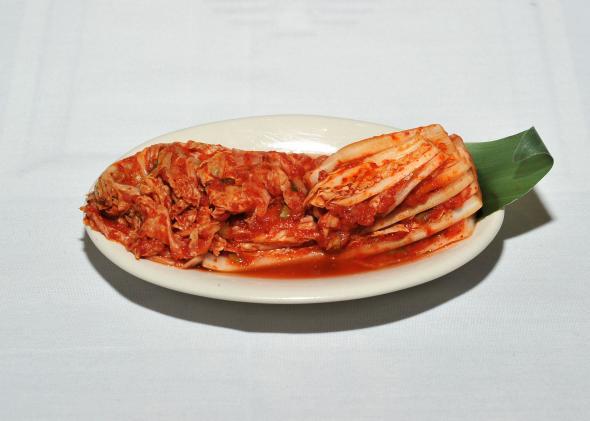The South Korean government has apparently decided that kimchi should no longer be referred to as pàocài 泡菜 (“pickled vegetables”) in China, Hong Kong, and Taiwan, but should have its own name to distinguish it from other types of pickled vegetables.
To be sure, the Koreans are justifiably very proud of kimchi. In fact, kimjang, the winter tradition of making and sharing kimchi, has recently been added to the UNESCO Intangible Cultural Heritage of Humanity list. My brother Thomas, who served in the Marines during the Vietnam War and fought alongside Korean soldiers, told me he was amazed that when the Koreans opened their K-rations … there was kimchi inside! So it’s obvious that kimchi is extremely important to Koreans, and it is indeed different from Chinese fermented vegetables. However, if it’s no longer to be referred to as pàocài 泡菜 in Chinese, what to call it?
It’s important to first note that it’s typical for the Chinese to call foreign things whatever they jolly well please. For example, the Mandarin word Niǔyuē 紐約—literally “button; knob; handle; wrench; turn” + “approximately; agreement; appointment”—neither sounds like “New York” nor even means what that name does, but that doesn’t stop the Chinese from referring to the Big Apple that way. It is interesting, however, that the South Koreans have been winning some battles recently with the Chinese over how to refer to things that mean a lot to them, even when the Chinese aren’t very happy about making the requested (demanded) changes.
One of the biggest victories was getting the Chinese to accept Shǒu’ěr 首爾 as the Chinese way to refer to Seoul, instead of Hànchéng 漢城 (“Han City”). Naturally, calling their capital “Han City” rankled, since “Han” is the name of the main Chinese ethnic group. In contrast, Shǒu’ěr 首爾 both sounds like “Seoul” and has a felicitously appropriate meaning (viz., “head” [shǒudū 首都 means “capital”]) + “thus; so”).
For kimchi, the Koreans have decided that the new Chinese name is going to be xīnqí 辛奇. The Chinese are not accustomed to this and some have suggested that it doesn’t make sense, since xīn 辛 is usually construed as meaning “bitter; suffering; laborious” and qí 奇 means “strange; odd; queer; rare.”
Upon reflection, however, xīnqí 辛奇 may not be such a bad choice after all, since xīn 辛 is often used to describe the spicy/sour flavor of foods like kimchi and may even be seen on packages for Korean instant noodles. Moreover, qí 奇 may be thought of not merely as “strange; odd,” but also “wonderful; marvelous; mysterious.”
So perhaps the person(s) who came up with xīnqí 辛奇 wanted to convey the idea that kimchi is spicy and mystical, which is not far from how I personally would describe that delicious side dish.
